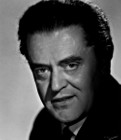ORFEO International – Catalogue
CDs
Anton Dermota
Is there anyone like him left today? And if so, where? The Slovenian tenor Anton Dermota was not just a member of the ensemble of the Vienna State Opera for over half a century. He was also a master of the stage and concert hall, celebrated all over the world from Milan to Buenos Aires. 
C 683 102 IAnd even in his prime in Vienna he did not hesitate to put to one side his famous roles (such as Tamino in Mozart’s Magic Flute) in order to take on smaller, less thankful roles too. This new release of his performances at the Vienna State Opera makes evident this versatility. His Tamino is given here both at the beginning and the end of our selection, the one in the immediate post-war years under Karl Böhm, the other an excerpt from the run of performances under Thomas Sanderling with which Demota made his farewell to the stage in 1981, at the age of 71! Nor may Dermota’s interpretation of Ferrando in Così fan tutte and of Don Ottavio in Don Giovanni be omitted from this double CD. It is delightful to hear the contrast between roles also sung by a buffo tenor, such as David in the Meistersinger or Jaquino in Beethoven’s Fidelio, and Dermota’s exploits as a tenore lirico spinto, such as Florestan in the latter opera. 
Anton Dermota
Foto: Foto FayerThe tricky, brief roles in Richard Strauss’s operas, such as the Singer in Rosenkavalier and Matteo in Arabella, were ones he mastered superbly. They too are to be found here, as is his Flamand in the legendary Capriccio ensemble with Elisabeth Schwarzkopf as the Countess. Anton Dermota appeared with various, equally splendid partners in Tchaikovsky’s Eugene Onegin – as Lenski he duelled before the radio microphone with George London and Dietrich Fischer-Dieskau, while as late as the 1970s he turned Monsieur Triquet’s burlesque into a subtle character study. He achieved the same feat as the betrayed, horribly murdered husband to Inge Borkh’s Katerina in the revised version of Shostakovich’s Lady Macbeth of Mtensk. And the title hero of Hans Pfitzner’s Palestrina offered him ample opportunity to draw on a lifetime of experience. To how many other tenors has suchlike ever been granted?
|